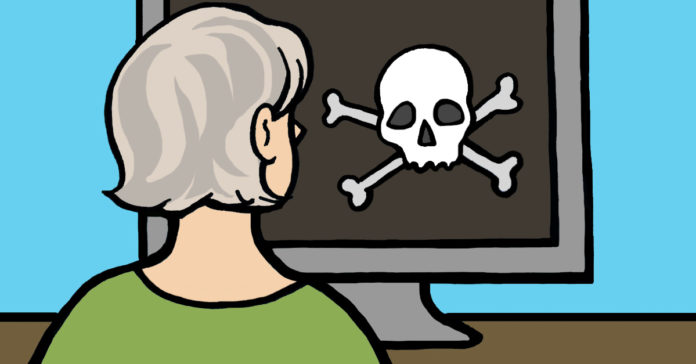 The internet can undoubtedly be a scary place.
The internet can undoubtedly be a scary place.
With identity theft, credit card hoax, email defrauds, and people pretending to be someone they aren’t, it might seem like we have no control over our own online safety.
Fortunately, there are plenty of experts out there who are working tirelessly to prevent such internet creepers from being successful. These experts know that there are actually lots of easy styles for you to stay safe online.
Scroll through this exclusive list below to visualize just how simple it is for you to navigate the internet safely and securely. I had heard of a couple of these tips-off, but most of them came as a complete amaze!
No one should ever seem unsafe or at-risk just because they want to checktheir email, order clothes online, or do some online banking. I know I’ll definitely be using all of these tips-off!
Do you have any other tips-off for biding safe online? Let us know in the comments.

Online Safety Tip# 1: Switch Up Your Password

Most people know that they should make their password something more complex than “1 234 ” or their phone number.
But not everyone knows that it’s vital to use a variety of different passwords.
Google’s spam and abuse chief, Mark Risher, told Time , “It’s much more important that you have unique passwords across all of the different sites that matter.”
It may be difficult to keep track of them all, but this extra precaution will help to keep your reports secure in the long run.
Online Safety Tip# 2: Check The URL For Phishing Scams

A phishing scam is one in which a fake website pretends to be a site that is familiar to you in order to trick you into providing your information.
Google’s Mark Risher likewise tells Time , “They just copy the exact page you’re used to seeing and set it in a social context that’s misleading.”
Always double check the exact name of the website before entering any datum, as “theres been” slight faults if it is a phishing scam.
Also, when you receive an email asking you to click a connection or provide information, check the sender’s email address to make sure it is actually “re coming out” who they say they are.
Online Safety Tip# 3: Retain Your Software Current

It can be annoying to update your security software all of the time, and pop-ups asking you to update may stimulate you want to click “No.”
However, according to the National Cyber Security Alliance, “Having the most recent security software, web browser, and operating system is the best defense against viruses, malware, and other online threats.”
If you are unsure of how to update your software, ask a computer savvy pal to depict you or visit your software website’s FAQ section.
Online Safety Tip# 4: When In Doubt, Delete It

There are plenty of people out there who will try to take advantage of you by asking you to send fund or information.
As a great rule of thumb, if you do not know the person or if you are at all in doubt, delete the email entirely.
According to theNational Cyber Security Alliance, “Links in email, tweets, posts, and online advertise are often how cybercriminals try to steal your personal information.
“Even if you know the source, if something lookings suspicious, delete it.”
Online Safety Tip# 5: Looking For The Lock

You may be nervous to shop online or unsure of which websites are safes for you to use.
One way to know if a website is taking precautions to keep your datum safe is if their web address begin with “https”( instead of just “http”) and if they have a little lock symbol right before it.
The National Cyber Security Alliancewrites, “When shopping, check to be sure the site is security enabled.
“Look for web addresses with https :// indicating extra measures to help secure your information.”
Online Safety Tip# 6: Employ Credit, Not Debit

You might think that they work the same way, but it is actually endlessly better to use a credit card than a debit card for online shopping.
According to Nerdwallet.com, in cases where there hoax, “With a credit card, the card issuer must oppose to get its fund back; with a debit card, it is necessary fighting to get your fund back.
“From a legal view, charge card generally furnish more protection against fraudulent activity.”
With debit card, you may have some liability for the stolen fund depending on how much and when it is reported, while this is not the case with credit.
Online Safety Tip# 7: Add Two-Factor Authentication

It might sound like a complicated term, but two-factor authentication is really quite easy to understand.
It simply means that your reports necessitate another code on top of your normal password.
The way it operates, your account will send a text message to your phone with a special security code that you will then enter into your computer.
According to Time , “With two-factor authentication, even if a hacker has your username and password, he or she won’t be able to access your account unless they likewise have your smartphone not a likely scenario.”
Online Safety Tip# 8: Know When You’ve Been Hacked

If your email address or Facebook account get hacked, it isn’t the end of the world, so long as you recognize it as soon as possible.
The National Cyber Security Alliancesuggests two simple ways to know if you’ve been hacked: “There are posts “youve never” constructed on your social network page; these posts often encourage your friends to click on a connection or download an app.
“A friend, family member, or colleague reports get email from you that “youve never” sent.”
In the event of a hacker , notify all of your contacts not to open messages or relates from you, update your security software, and change all of your passwords.
Online Safety Tip# 9: Check For Strange Charges, Posts, Or Emails

The best defense against online hoax is to keep a close watch on all of your financials, social media posts, and internet correspondence.
McAfee’s cybersecurity blog writes, “Routinely check your various financial statements for questionable activity.”
If you are constantly monitoring your reports, you can catch hoax the second it results, saving you hassle and fund in the long run.
Online Safety Tip #10: Read Reviews Before You Buy

Before you click “purchase, ” it is important to know if others have had a problem with this particular merchant or website.
Simply read reviews before you decide if a website is safe enough to receive your business.
According to theNational Cyber Security Alliance, “When utilizing a new website for purchases, read the examinations and see if other consumers have had a positive or negative experience with the site.”
If you notice a lot of negative reviews, you may just need to cancel your purchase and bring your business somewhere else.
Following these online security tips-off canfinally allow you to feel confident and protected with your internet experience!
Do you know of any other online security tips-off? Let us know in the comments.
Please SHARE this extremely important information with anyone who finds the internet to be a scary place!
Read more here: http :// littlethings.com /







